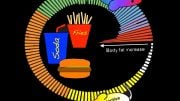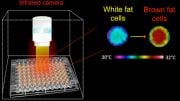
New research has shown for the first time that energy release may be the molecular mechanism through which our internal clocks control energy balance. These findings have broad implications from dieting to sleep loss and more.
Health benefits come from eating during the daytime, demonstrating a potential link to energy release.
Scientists at Northwestern Medicine have uncovered the mechanism behind why eating late at night is linked to diabetes and weight gain. According to the CDC, 37.3 million Americans have diabetes, which is 11.3% of the US population. An additional 96 million Americans aged 18 years or older have prediabetes, which is 38.0% of the adult US population. Obesity is a common, serious, and costly disease, with a US obesity prevalence of 41.9%, according to the CDC.
The connection between eating time, sleep, and obesity is well-known but poorly understood, with research showing that overnutrition can change fat tissue and disrupt circadian rhythms.
For the first time, new Northwestern research has shown that energy release may be the molecular mechanism through which our internal clocks control energy balance. From this understanding, the researcher also found that daytime is the ideal time in the light environment of the Earth’s rotation when it is most optimal to dissipate energy as heat. These findings have broad implications from dieting to sleep loss, as well as the way we feed patients who require long-term nutritional assistance.
The paper, “Time-restricted feeding mitigates obesity through adipocyte thermogenesis,” was published on October 20 in the journal Science.
“It is well known, albeit poorly understood, that insults to the body clock are going to be insults to metabolism,” said corresponding study author Dr. Joseph T. Bass, the Charles F. Kettering Professor of Medicine at Northwestern University Feinberg School of Medicine. He also is a Northwestern Medicine endocrinologist.
“When animals consume Western-style cafeteria diets — high fat, high carb — the clock gets scrambled,” Bass said. “The clock is sensitive to the time people eat, especially in fat tissue, and that sensitivity is thrown off by high-fat diets. We still don’t understand why that is, but what we do know is that as animals become obese, they start to eat more when they should be asleep. This research shows why that matters.”
Bass is also director of the Center for Diabetes and Metabolism and the chief of endocrinology in the department of medicine at Feinberg. Chelsea Hepler, a postdoctoral fellow in the Bass Lab, was the first author and did many of the biochemistry and genetics experiments that grounded the team’s hypothesis. Rana Gupta, now at Duke University, was also a key collaborator.
Scrambling the internal clock
In the study, mice, who are nocturnal, were fed a high-fat diet either exclusively during their inactive (light) period or during their active (dark) period. Within a week, mice fed during light hours gained more weight compared to those fed in the dark. To mitigate the effects of temperature on their findings, the scientists set the temperature to 30 degrees, where mice expend the least energy.
“We thought maybe there’s a component of energy balance where mice are expending more energy eating at specific times,” Hepler said. “That’s why they can eat the same amount of food at different times of the day and be healthier when they eat during active periods versus when they should be sleeping.”
The increase in energy expenditure led the team to look into metabolism of fat tissue to see if the same effect occurred within the endocrine organ. They found that it did, and mice with genetically enhanced thermogenesis — or heat release through fat cells — prevented weight gain and improved health.
Hepler also identified futile creatine cycling, in which creatine (a molecule that helps maintain energy) undergoes storage and release of chemical energy, within fat tissues, implying creatine may be the mechanism underlying heat release.
Findings could inform chronic care
The science is underpinned by research done by Bass and colleagues at Northwestern more than 20 years ago that found a relationship between the internal molecular clock and body weight, obesity, and metabolism in animals.
The challenge for Bass’s lab, which focuses on using genetic approaches to study physiology, has been figuring out what it all means, and finding the control mechanisms that produce the relationship. This study brings them a step closer.
The findings could inform chronic care, Bass said, especially in cases where patients have gastric feeding tubes. Patients are commonly fed at night while they sleep, when they’re releasing the least amount of energy. Rates of diabetes and obesity tend to be high for these patients, and Bass thinks this could explain why. He also wonders how the research could impact Type II Diabetes treatment. Should meal times be considered when insulin is given, for example?
Hepler will continue to research creatine metabolism. “We need to figure out how, mechanistically, the circadian clock controls creatine metabolism so that we can figure out how to boost it,” she said. “Clocks are doing a lot to metabolic health at the level of fat tissue, and we don’t know how much yet.”
Reference: “Time-restricted feeding mitigates obesity through adipocyte thermogenesis” by Chelsea Hepler, Benjamin J. Weidemann, Nathan J. Waldeck, Biliana Marcheva, Jonathan Cedernaes, Anneke K. Thorne, Yumiko Kobayashi, Rino Nozawa, Marsha V. Newman, Peng Gao, Mengle Shao, Kathryn M. Ramsey, Rana K. Gupta and Joseph Bass, 20 October 2022, Science.
DOI: 10.1126/science.abl8007
Research support was provided by the National Institutes of Health National Institute of Diabetes and Digestive and Kidney Diseases (grants R01DK127800, R01DK113011, R01DK090625, F32DK122675, F30DK116481, F31DK130589, K99DK124682, R01DK104789 and R01DK119163), the National Institute on Aging (grants R01AG065988 and P01AG011412) and the American Heart Association Career Development Award (19CDA34670007).









Interesting, but w/out reading the original research, the title of SciTechdaily article is false. The scientists didn’t discover why, they have done an experiment which may show a connection between time of eating & diabetes/weight gain.
Maybe you could change your company to SciTechDiss.
Fake news. If you’re eating the correct amount of calories, it doesn’t matter when you eat them. Eating at night doesn’t give you diabetes or make you gain weight, eating too much food gives you diabetes, and makes you gain weight. If you only eat at night, but are eating in a caloric deficit, you will LOSE weight. Stop your magical thinking, your gluttony is the sole cause of your obesity, and/or your t2 diabetes.
Where did you get your doctorate?
So you’re telling me that people in Italy, Spain and France should all have diabetes. North Americans have an earlier dinner at 5-7pm and they predominantly have diabetes.
As of this month, starting with the FDA (with replies) in October of 2005, I’ve been writing of the little known relationship between medically undiagnosed food allergies, added MSG (expanded use as an alleged ‘flavor enhancer’ FDA approved in 1980; obesity/diabetes epidemic presented by 1990, CDC/NCHS data), chronic disease and obesity for a full seventeen years. Insomnia is still a frequent symptom of mine. Through the years, out of more than 2,500 total recipients, I’ve written several researchers at Northwestern University; such slow learners.
How would these findings translate to night shift workers such as nurses who work 12 hour shifts? This is counter to internal clocks, but activity occurs when one “should be” sleeping.
In Traditional Chinese Medicine, there is an internal organ clock that shows which organs are functioning at what time. This helps establish idea feeding times and shows why it’s important to go to sleep by a certain time. Each major organ “turns on” twice per day- once to metabolize, and one to cleanse/regenerate. If we adhere to a 12hr (healthy diet and) feeding window between 7am and 7pm, going to sleep by 11pm, all our organs will probably function properly, with the daytime hours for using energy and night hours for purification and regeneration.
I take heavy dinner everyday at around 11pm and sometimes even at 12am and regular with ice creams / chocolates after dinner. But no weight gain yet ☹
Humans have a long history (at least back to caveman days) of massive energy expenditure (hunting), then gorging ourselves on our catch, then sleeping. We aren’t built to be nibblers like mice, and living that way, given our ready access to food, may be the problem.
with no science background i thought it(my diabetes) came from drinking sugery sodas 3or4, late at night and pizza fast food, brownies ect… then it was hard on my pancreas to push out that much insulin.consequently: my muscles were inert esp. during sleep and watching tv(about food and food commercials)and the food overworked my pancreas and my muscles werent doing anything to burn the sugar.whamoo: diabetes.if i stopped eating after 6pm.back then i may not have had diabeates.